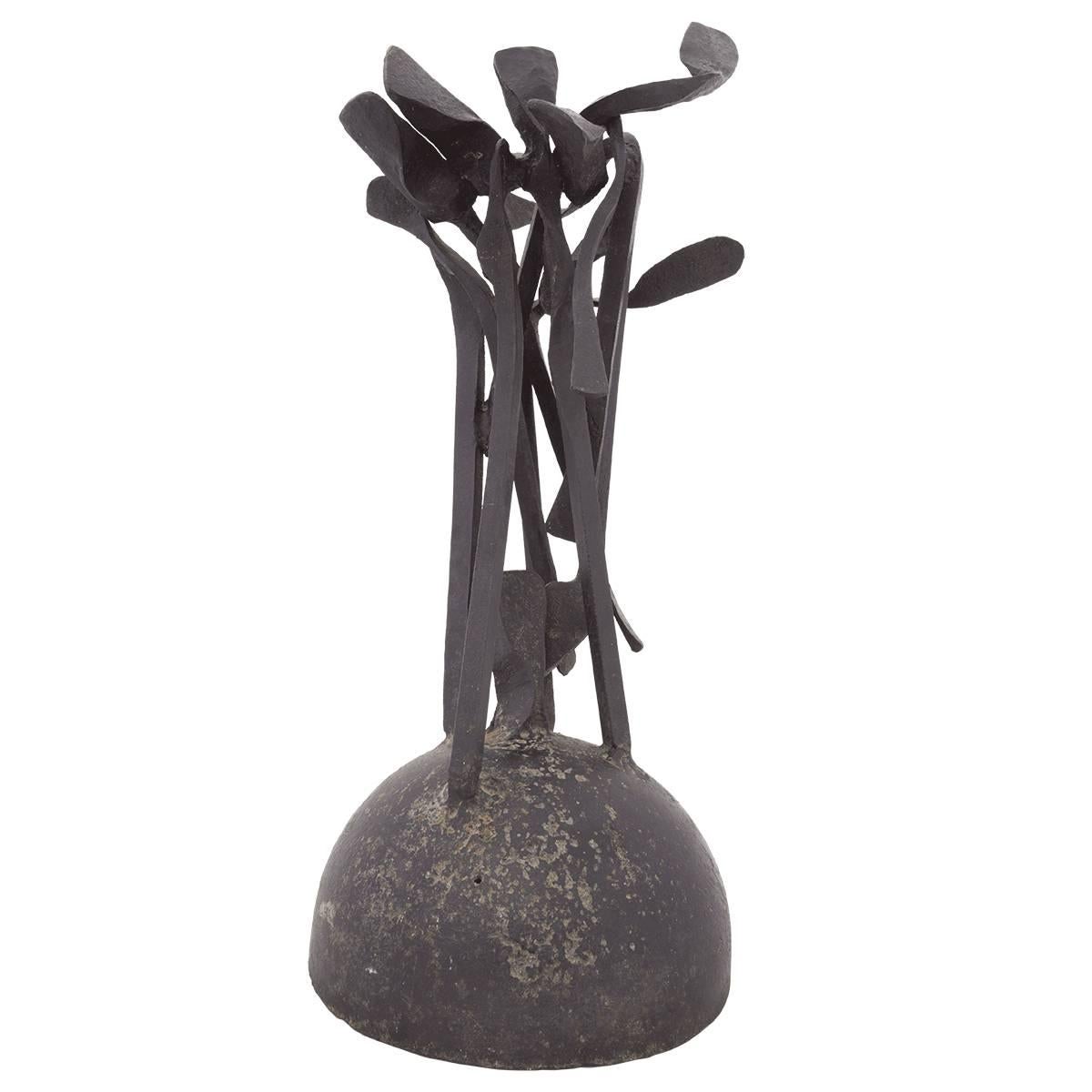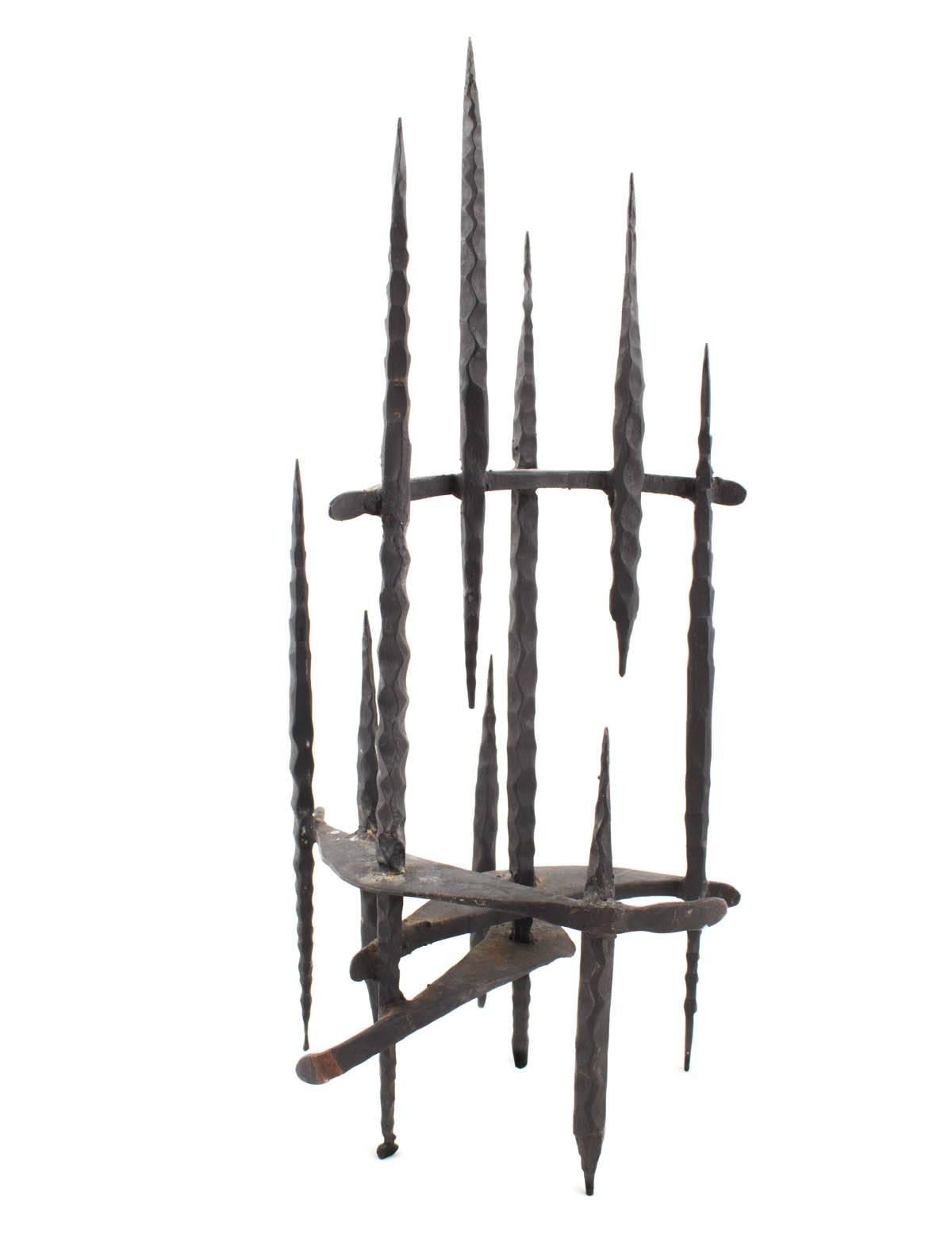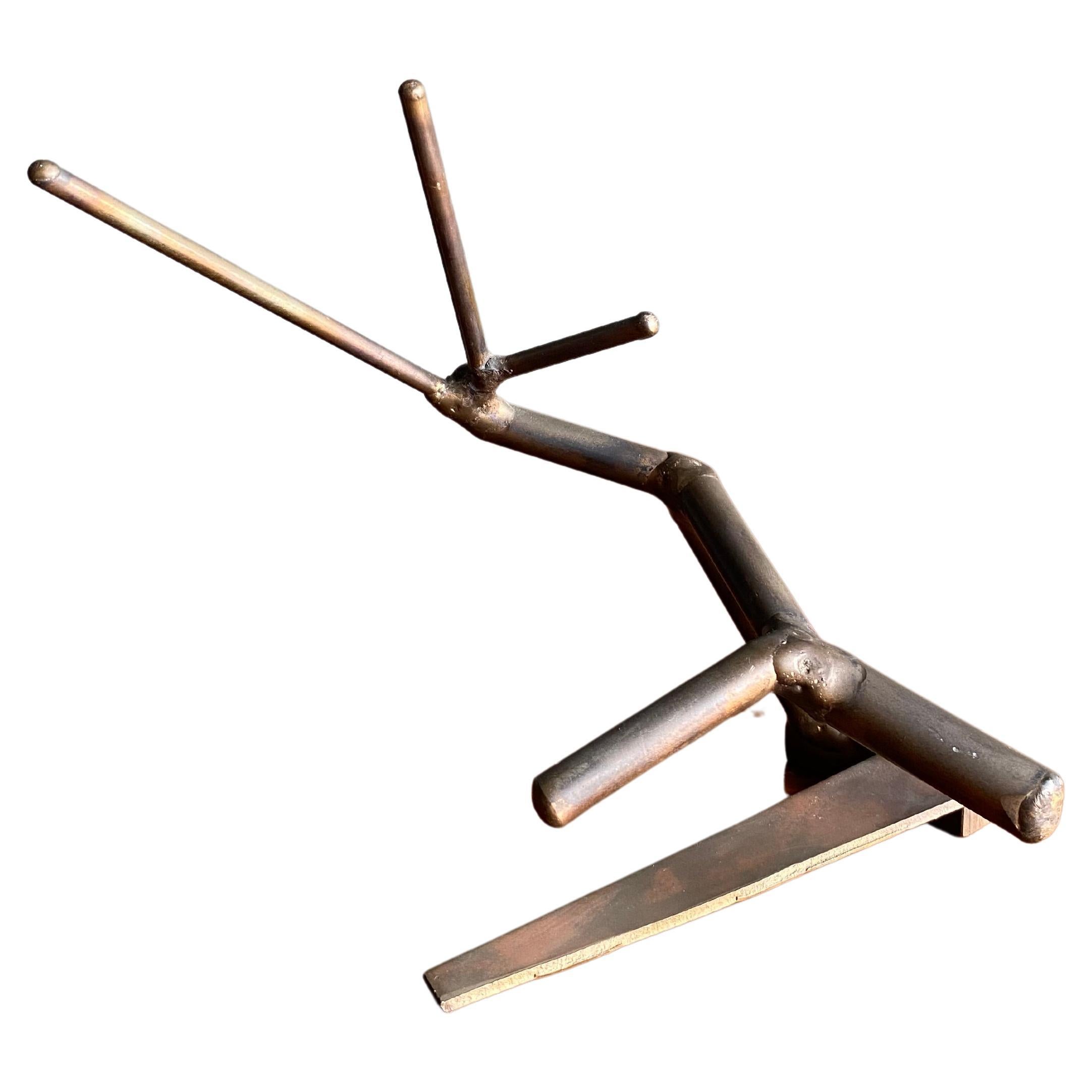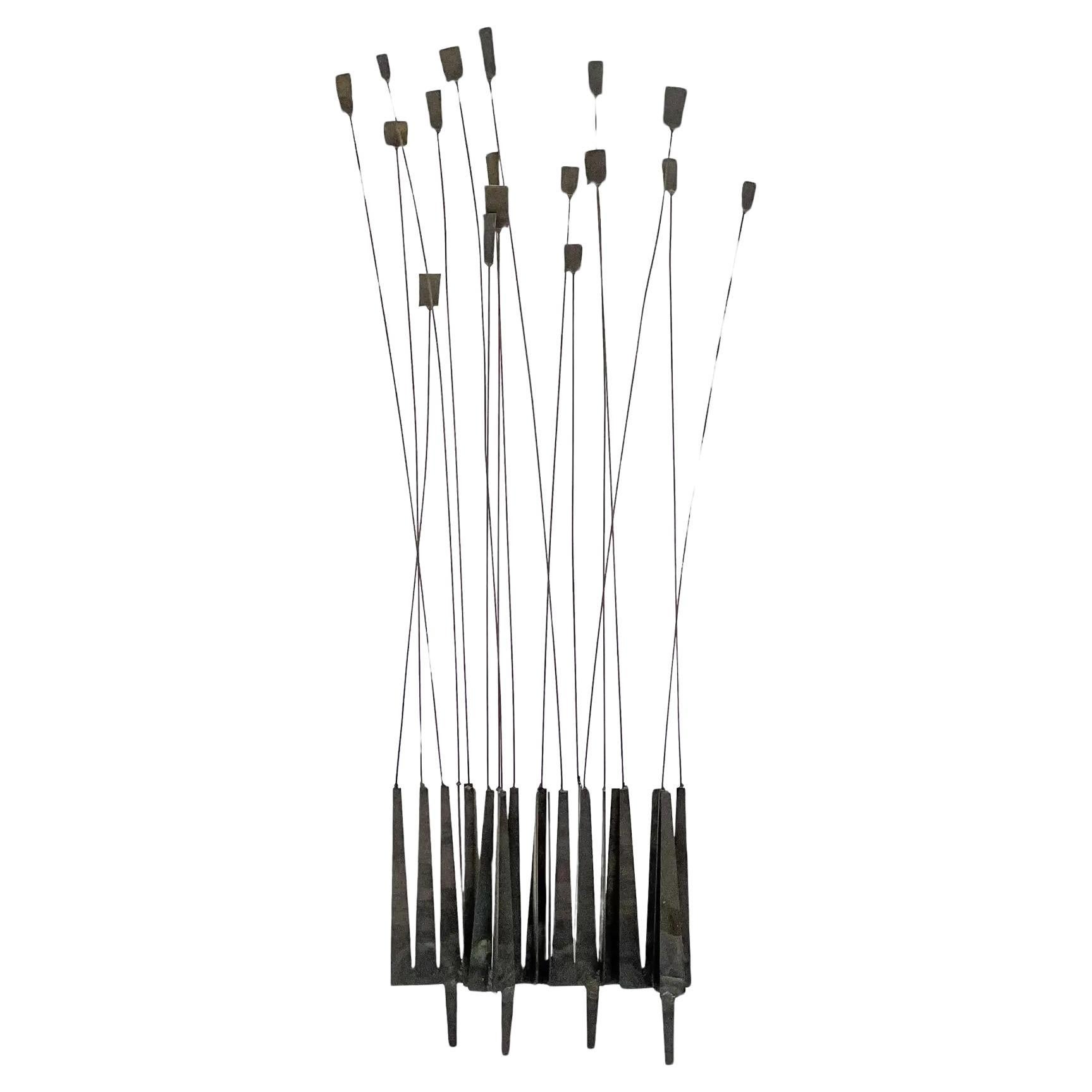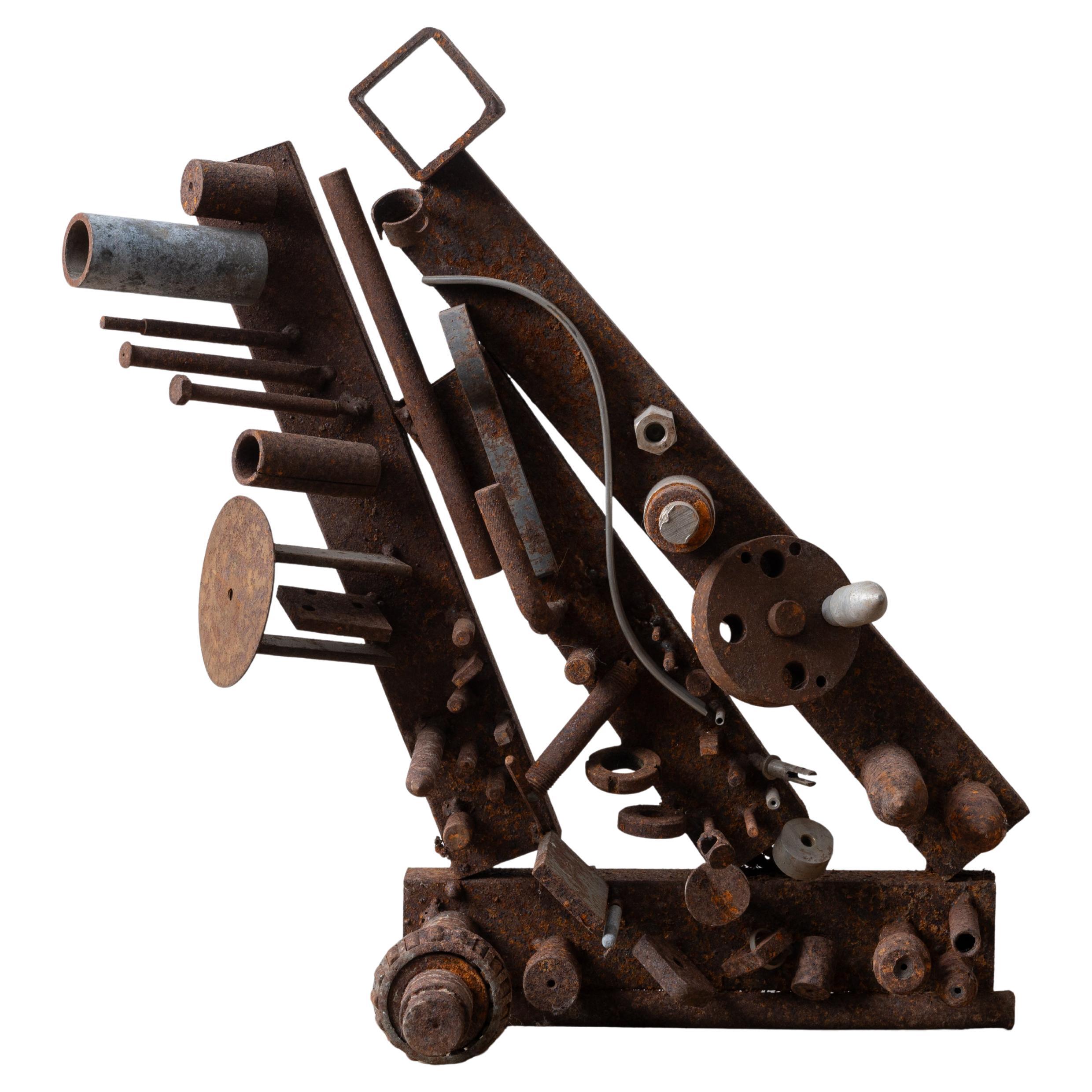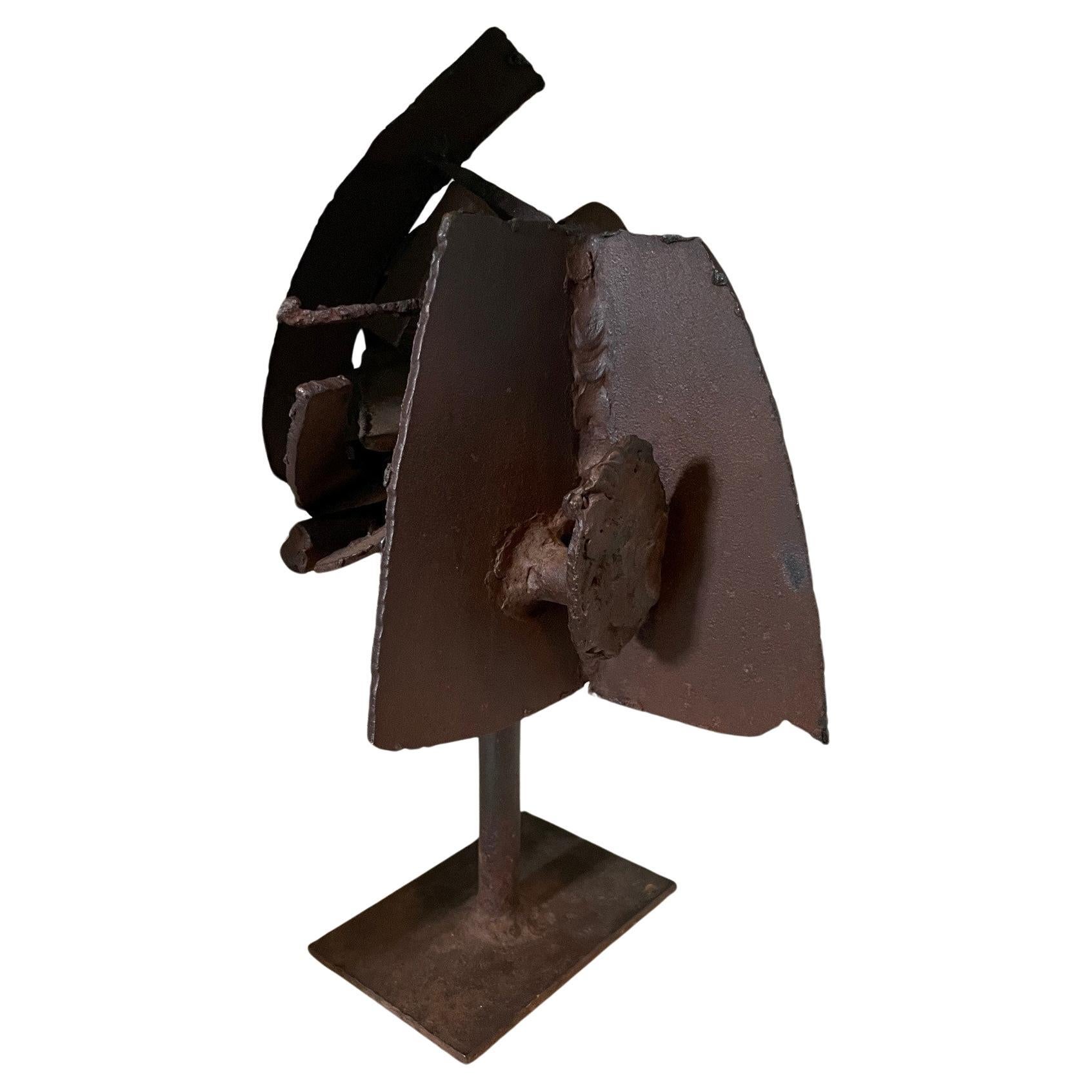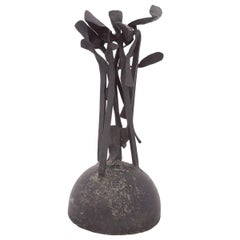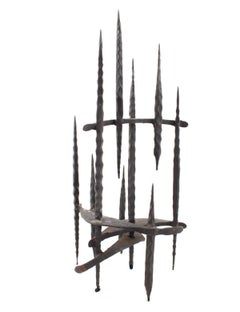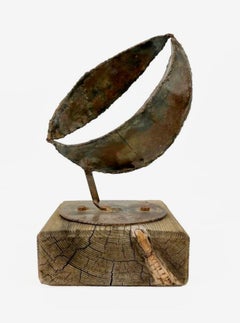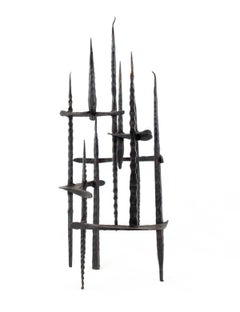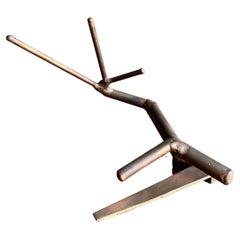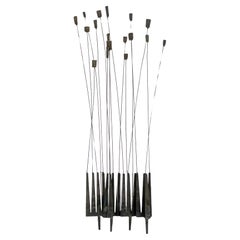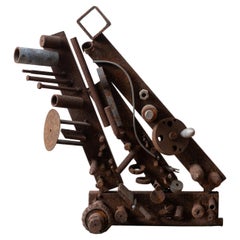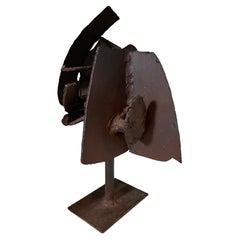Items Similar to Untitled, Steel, Iron Bella Feldman Brutalist Sculpture
Want more images or videos?
Request additional images or videos from the seller
1 of 5
Bella FeldmanUntitled, Steel, Iron Bella Feldman Brutalist Sculpture
$9,500
£7,212.24
€8,249.26
CA$13,272.88
A$14,762.34
CHF 7,708.43
MX$179,641.94
NOK 98,448.46
SEK 92,327.29
DKK 61,567.40
Shipping
Retrieving quote...The 1stDibs Promise:
Authenticity Guarantee,
Money-Back Guarantee,
24-Hour Cancellation
About the Item
Bella Feldman (American, b. 1930), Untitled, metal 2-wheeled cart with metal cables, (Provenance: Allan Stone Gallery, New York, NY) gallery label affixed affixed verso, overall: 37"h x 48"l x 37"w. Provenance: Private Collection
Bella Feldman is an American sculptor whose work addresses the themes of sexuality, war, and the persistent anxiety of the industrial age. Feldman is known for pioneering the use of glass with steel. Her work has affinities with Surrealism, Post-Minimalism, and the Feminist art movement, although she has no formal affiliation with these. A Professor Emeritus at the California College of the Arts, Feldman lives and works in Oakland, CA and London, England.
Bella Feldman was born in 1930 in New York City to a family of working-class Jewish immigrants from Poland. She grew up in the Bronx tenements. Feldman attended The High School of Music & Art in Manhattan during World War II. Students were required to visit museums and galleries as part of the curriculum. When Feldman was thirteen, she visited her first art museum, the Museum of Modern Art. There, she saw Meret Oppenheim’s Object (1936), the fur-lined cup and saucer, and was struck by her strong psychological response to this work. Other early influences included Alberto Giacometti’s The Palace at 4 a.m. (1932) and the sculpture of David Smith. One of Feldman’s earliest sculptures Warrior (1952) pays tribute to Giacometti.
During the Holocaust, Feldman lost numerous family members who remained in Poland, an experience that helped shape her worldview. This includes her life-long preoccupation with war, and the overwhelming effects of the military-industrial complex.
Feldman received a BA from Queens College, City University of New York. She married Leonard Feldman at age 18, and moved to California with him in 1951 where they both accepted teaching positions. Feldman has two children, Nina Feldman, born 1954 and Ethan Feldman, born 1956.
In 1965, Feldman started teaching at the California College of the Arts. In 1971 she and her family moved to Uganda, East Africa on a grant from the E. L. Cabot Trust Fund at Harvard University. Feldman spent two years teaching art in Uganda prior to the genocidal war in that country. Upon her return to CCA, she faced gender discrimination and a threat to her job. Her successful fight to retain her position prompted her to later become an advocate for other women faculty, who she helped to achieve equity and job security. Feldman was awarded an MA in 1973 from San Jose State University. Her teachers were Sam Richardson, John Battenberg and Fletcher Benton.
In the 1970s, Feldman completed several installations portraying different stages of animal metamorphosis. These featured hybrid, mutant creatures, reminiscent of Hieronymus Bosch’s triptych The Garden of Earthly Delights—rats transformed into fish, and turtles with human features. The small-scale sculptures were displayed in large clusters, their multitude invoking aggression and infestation. Birds (1970), a cast metal flock of dead birds, preceded Kiki Smith’s Jersey Crows (1995) while Metamorphic Turtles (1973-75) anticipated Smith’s Sirens and Harpies (2002).
War Toys and War Toys Redux
War Toys (1992) is a series created in response to the first Gulf War. Feldman was incensed by the tone of admiration she heard in President George Bush’s voice when he referred to the Patriot missile. These works mocked the allure of weaponry and perceived glory in violence. The War Toys series relates to Magdalena Abakanowicz War Games' sculptures (1989), giant monstrous weapons made of metal and wood. However, the scale and sensuality of Feldman’s War Toys strip them of power. The series is in the tradition of contemporary women artists’ critique of war that entwines images of male sexuality and military aggression. Examples include Nancy Spero The War Series (1966–70), a response to the Vietnam War, and Judith Bernstein’s Iraq Travel Poster (1969).
War Toys Redux (2003) evoked a different kind of mutation: the metal sculptures represented a hybrid between organic and machine forms. This adaptation continued the series with a new medium, combining blown glass with steel armatures. The sensuality of soft, bulbous glass forms reinforced the vision of earlier War Toys, effeminizing the objects of aggression and rendering them impotent.
Flasks of Fiction
Feldman pioneered the technique of blowing glass into metal forms in the late 1990s. The first series of mostly hanging sculptures Flasks of Fiction (1998-2001) were originally inspired by the lanterns in mosques Feldman visited while in Turkey. She said of these: “I combined glass and metal to suggest vulnerability and constraint as well as seduction.” Flasks of Fiction aligns Feldman with Post-Minimalist sculptors, such as Eva Hesse, who explored the inherent properties of materials and experimented with tension that results from binding bulging forms or upholding drooping forms. In Flasks of Fiction, hardened materials such as glass and steel make explicit references to bodies and sexuality, making the viewer respond viscerally to the corporeal hybrids.
Large Sculpture
Since 2003, Feldman has created a number of large-scale sculptures that embody her life-long interest in process and materials. Combining metal and glass, organic forms and machine parts, aggression and vulnerability, such works as Dyad (2003) and Jacob’s Ladder (2011) refer to Martin Puryear in scale and to Louise Bourgeois in psychic intensity.
Exhibitions, Collections, Awards
Feldman has won numerous awards for her work, and her sculpture is featured in private and museum collections, including the Fine Arts Museums of San Francisco, the di Rosa Preserve, Napa, CA, and the Palm Springs Desert Museum. Her work has been exhibited nationally and internationally at museums and galleries including The Oakland Museum of California; the Berkeley Art Museum; Musée des Beaux Arts, Lausanne, Switzerland; the Alternative Museum, New York; the Contemporary Jewish Museum San Francisco; Habatat Galleries, Chicago and Royal Oaks, MI; and Jan Baum Gallery, Los Angeles. Feldman was awarded a National Endowment for the Arts Individual Artists award in 1986 and received Distinguished Artist Awards from Kala Art Institute, Berkeley, CA (2004), and Women’s Caucus for the Arts (2005). A fifty-year survey of her work took place at The Richmond Art Center, Richmond, CA in 2013.
- Creator:Bella Feldman (1930, American)
- Dimensions:Height: 48 in (121.92 cm)Width: 37 in (93.98 cm)Depth: 37 in (93.98 cm)
- Medium:
- Movement & Style:
- Period:
- Condition:
- Gallery Location:Surfside, FL
- Reference Number:1stDibs: LU38211197262
About the Seller
4.9
Platinum Seller
Premium sellers with a 4.7+ rating and 24-hour response times
Established in 1995
1stDibs seller since 2014
1,784 sales on 1stDibs
Typical response time: <1 hour
- ShippingRetrieving quote...Shipping from: Surfside, FL
- Return Policy
Authenticity Guarantee
In the unlikely event there’s an issue with an item’s authenticity, contact us within 1 year for a full refund. DetailsMoney-Back Guarantee
If your item is not as described, is damaged in transit, or does not arrive, contact us within 7 days for a full refund. Details24-Hour Cancellation
You have a 24-hour grace period in which to reconsider your purchase, with no questions asked.Vetted Professional Sellers
Our world-class sellers must adhere to strict standards for service and quality, maintaining the integrity of our listings.Price-Match Guarantee
If you find that a seller listed the same item for a lower price elsewhere, we’ll match it.Trusted Global Delivery
Our best-in-class carrier network provides specialized shipping options worldwide, including custom delivery.More From This Seller
View AllMid Century Modern Brutalist Welded Abstract Expressionist Sculpture
Located in Surfside, FL
Neo-Dada Abstract Sculpture: Assemblages
In contrast, abstract sculpture followed a slightly different course. Rather than focusing on non-figurative subject matter, it concentrated...
Category
Mid-20th Century Abstract Expressionist Abstract Sculptures
Materials
Metal
Mid Century Brutalist Iron Sculpture, Israeli Master David Palombo
By David Palombo
Located in Surfside, FL
Hand Forged Iron Candelabra
Holocaust Memorial Judaic Menorah Sculpture
David Palombo was an Israeli sculptor and painter. He was born in Turkey to a traditional family and immigrated to the Land of Israel with his parents in 1923. They lived in the Nahalat Shiva neighborhood of Jerusalem. In 1940 he began his studies at Bezalel Academy of Arts and Design, and from 1942 was a student of sculptor Ze’ev Ben-Zvi. For a period of time, Palombo was an assistant at Ben-Zvi’s studio and also taught at Bezalel. During this period he was also a member of the “Histadrut HaNoar HaOved VeHaLomed” (The General Federation of Students and Young Workers in Israel). In the 1940s he took art lessons at night. In 1948 he went to Paris, where he visited the studio of the sculptor Constantin Brancusi whose work influenced him. Around 1958 he married the artist Shulamit Sirota. In 1960 he quit his job to devote himself to art. In 1964 he married for the second time to the artist Yona Palombo. The two of them went to live in an abandoned home on Mount Zion in Jerusalem. In 1966 he was killed when the motorcycle on which he was riding ran into a chain stretched across the street to prevent the desecration of Shabbat. His widow opened a museum in their home that was active until the year 2000.
Work by Palombo is included in the Judaic collection of the Jewish Museum (a well known Hanukkah menora). Palombo executed the impressive metal gates of the Tent of Remembrance at the Yad Vashem, the memorial to the martyrs of the holocaust, as well as the gates to the Knesset Building the United Nations Educational Scientific and Cultural Organization (Unesco award) awarded him a scholarship for study in Japan. He worked in marble, granite, bronze, iron and steel. as well as with glass mosaic tiles. Palombo’s early works, in the 1950s, were influenced by modernist sculptors such as Brancusi. These works were composed of abstract images from nature and were carved out of stone or wood. At the end of the 1950s he began making metal sculptors, using the technique of welding. His work took on a more abstract and expressive character.
Education
1940 Painting with Isidor Ascheim, New Bezalel School for Arts and Crafts, Jerusalem
1942 Sculpture with Zeev Ben Zvi, Jerusalem
1956 Mosaic, Ravenna, Italy
1958 Welding Course
Awards And Prizes
1966 UNESCO Award
Exhibitions:
Sculpture in Israel, 1948-1958 Mishkan Museum of Art, Kibbutz Ein Harod
Artists: Zvi Aldouby, Yitzhak Danziger, Arieh Merzer, Dov Feigin, Aaron Priver, David Palumbo, Menashe Kadishman, Kosso Eloul, Yehiel Shemi, Zahara Schatz.
The Spring Exhibition of Jerusalem Artists, Artists' House, Jerusalem
Artists: Palombo, David Bezalel Schatz, Mordechai Levanon, Fima, Ludwig Blum
12 Artists, The Bezalel National Museum, Jerusalem
Avraham Ofek, Aviva Uri, Avigdor Arikha, Yosl Bergner, Lea Nikel, Palombo, Ruth Zarfati,
General Exhibition, Art in Israel 1960 Tel Aviv Museum of Art
Artists: Naftali Bezem, Nachum Gutman, Shraga Weil, Shraga, Marcel Janco, Ruth Schloss
Category
Mid-20th Century Arte Povera Abstract Sculptures
Materials
Iron
1965 Canadian Israeli Art Brutalist Abstract Welded Steel Sculpture Eli Ilan
Located in Surfside, FL
Eli Ilan (אלי אילן), 1928-1982 was an Israeli sculptor.
Abstract organic pod shape. in either steel or iron mounted on a wooden plinth.
Ilan was born in Winnipeg, Manitoba. He enrolled in a premedical curriculum at the University of British Columbia in Vancouver and emigrated to Israel in 1948. He then studied prehistoric archaeology and physical anthropology at the Hebrew University of Jerusalem. In 1956, he returned to Canada to study sculpture at the Ontario College of Art & Design. He lived in Kibbutz Sasa from 1959 to 1963. He died in 1982 in Caesarea, Israel.
Education
1955 Hebrew University, Jerusalem, pre-historic archaeology and physical anthropology
1956 Ontario College of Art, Toronto, Canada, sculpture under Thomas Bowie
1959 Training College, Ottawa, criminal identification techniques
1969 Art Festival, Painting & Sculpture in Israel. Ganei Hataarucha, Tel Aviv
Artists: Chana Orloff, Eli Ilan, Zvi Aldouby, Jacob El Hanani, Ludwig Blum, Aharon Bezalel, Koki Doktori, Israel Hadany, Marcel Janco, Dov Feigin, Abel Pann, Esther Peretz Arad, Reuven Rubin, Ivan Schwebel, Jakob Steinhardt, Boris Schatz, Bezalel (Lilik) Schatz, Louise Schatz...
Category
1960s Abstract Abstract Sculptures
Materials
Stainless Steel
Mid Century Brutalist Iron Sculpture, Israeli Master David Palombo
By David Palombo
Located in Surfside, FL
Hand Forged Iron Candelabra
Holocaust Memorial Judaic Menorah Sculpture
David Palombo was an Israeli sculptor and painter. He was born in Turkey and immigrated to the Land of Isra...
Category
Mid-20th Century Arte Povera Abstract Sculptures
Materials
Iron
Abstract Expressionist Patinated Metal Assemblage Sculpture Steel, Nuts, Bolts
By Robert Goodnough, 1917-2010
Located in Surfside, FL
Robert Arthur Goodnough (AMERICAN, 1917-2010)
Untitled
patina on steel with nuts and bolts
Robert Goodnough (October 23, 1917 – October 2, 2010) was an American abstract express...
Category
20th Century Abstract Expressionist Abstract Sculptures
Materials
Metal
Mid Century Brutalist Iron, Stone Sculpture, Israeli Master David Palombo
By David Palombo
Located in Surfside, FL
Hand Forged Iron and Drilled Stone Candelabra
Holocaust Memorial Judaic Menorah Sculpture
David Palombo was an Israeli sculptor and painter. He was born in Turkey to a traditional family and immigrated to the Land of Israel with his parents in 1923. They lived in the Nahalat Shiva neighborhood of Jerusalem. In 1940 he began his studies at Bezalel Academy of Arts and Design, and from 1942 was a student of sculptor Ze’ev Ben-Zvi. For a period of time, Palombo was an assistant at Ben-Zvi’s studio and also taught at Bezalel. During this period he was also a member of the “Histadrut HaNoar HaOved VeHaLomed” (The General Federation of Students and Young Workers in Israel). In the 1940s he took art lessons at night. In 1948 he went to Paris, where he visited the studio of the sculptor Constantin Brancusi whose work influenced him. Around 1958 he married the artist Shulamit Sirota. In 1960 he quit his job to devote himself to art. In 1964 he married for the second time to the artist Yona Palombo. The two of them went to live in an abandoned home on Mount Zion in Jerusalem. In 1966 he was killed when the motorcycle on which he was riding ran into a chain stretched across the street to prevent the desecration of Shabbat. His widow opened a museum in their home that was active until the year 2000.
Work by Palombo is included in the Judaic collection of the Jewish Museum (a well known Hanukkah menora). Palombo executed the impressive metal gates of the Tent of Remembrance at the Yad Vashem, the memorial to the martyrs of the holocaust, as well as the gates to the Knesset Building the United Nations Educational Scientific and Cultural Organization (Unesco award) awarded him a scholarship for study in Japan. He worked in marble, granite, bronze, iron and steel. as well as with glass mosaic tiles. Palombo’s early works, in the 1950s, were influenced by modernist sculptors such as Brancusi. These works were composed of abstract images from nature and were carved out of stone or wood. At the end of the 1950s he began making metal sculptors, using the technique of welding. His work took on a more abstract and expressive character.
Education
1940 Painting with Isidor Ascheim, New Bezalel School for Arts and Crafts, Jerusalem
1942 Sculpture with Zeev Ben Zvi, Jerusalem
1956 Mosaic, Ravenna, Italy
1958 Welding Course
Awards And Prizes
1966 UNESCO Award
Exhibitions:
Sculpture in Israel, 1948-1958 Mishkan Museum of Art, Kibbutz Ein Harod
Artists: Zvi Aldouby, Yitzhak Danziger, Arieh Merzer, Dov Feigin, Aaron Priver, David Palumbo, Menashe Kadishman, Kosso Eloul, Yehiel Shemi, Zahara Schatz.
The Spring Exhibition of Jerusalem Artists, Artists' House, Jerusalem
Artists: Palombo, David Bezalel Schatz, Mordechai Levanon, Fima, Ludwig Blum
12 Artists, The Bezalel National Museum, Jerusalem
Avraham Ofek, Aviva Uri, Avigdor Arikha, Yosl Bergner, Lea Nikel, Palombo, Ruth Zarfati,
General Exhibition, Art in Israel 1960 Tel Aviv Museum of Art
Artists: Naftali Bezem, Nachum Gutman, Shraga Weil, Shraga, Marcel Janco, Ruth Schloss
Category
Mid-20th Century Arte Povera Abstract Sculptures
Materials
Stone, Iron
You May Also Like
Abstract Metal Sculpture Signed " BE 2010 "
By Harry Bertoia
Located in San Juan Capistrano, CA
Abstract Metal Sculpture Signed " BE 2010 " Welded steel with a bronze finish
Category
21st Century and Contemporary American Modern Abstract Sculptures
Materials
Metal
$180 Sale Price
20% Off
Vintage Abstract Sculpture by William Bowie
Located in Westlake Village, CA
This stunning Vintage Abstract Sculpture by William Bowie, dating back to the 1960s, showcases the artist’s unique approach to modern and abstract design. The sculpture is in overall...
Category
Vintage 1960s American Abstract Sculptures
Materials
Metal, Steel
Giovanni 'John’ Bucci Metal Art Sculpture, 1960s
Located in Savannah, GA
Giovanni 'John' Bucci
(Italian-American, 1935-2019)
A welded metal sculpture composed of various found metal pieces, 1960s.
17 inches wide by 18 ¼ inches tall by 8 inches deep
Category
Vintage 1960s American Brutalist Abstract Sculptures
Materials
Metal
Brutalist Welded Iron Sculpture
Located in LOS ANGELES, CA
A striking Brutalist welded iron sculpture depicting an abstract geometric composition upon a tubular stem, above a rectangular base, in the manner of H...
Category
Mid-20th Century Unknown Brutalist Abstract Sculptures
Materials
Iron
Glen Davis Welded Metal Sculpture
By Glen Davis
Located in Chicago, IL
c. 1970s in great vintage condition. W. Glen Davis is an American sculptor who was born in the 20th Century
Category
Vintage 1970s American Brutalist Abstract Sculptures
Materials
Metal
Unusual Brutalist Steel Sculpture
By David Smith
Located in St.Petersburg, FL
An unusual steel-torch cut and welded sculpture. Brutalist and jazzy. Unsigned. Heavy thick steel with patina and some areas gilded.
Category
Vintage 1960s American Mid-Century Modern Abstract Sculptures
Materials
Cut Steel
More Ways To Browse
Sculpture Two Faces
Wood Brutalist Sculpture
Sculpture Cast Iron
Brutalist Wood Art
Minimalist Steel Sculptures
Glass Face Sculpture
White Bird Sculpture
Large Male Sculpture
Brutalist Art Glass
Brutalist Steel Sculpture
Iron Giacometti
Brutalist Sculpture Iron
Male Metal Sculpture
Stone Fish Sculpture
Cast Iron Machine
Iron Bird Sculpture
Cast Iron Face
African Iron Wood
